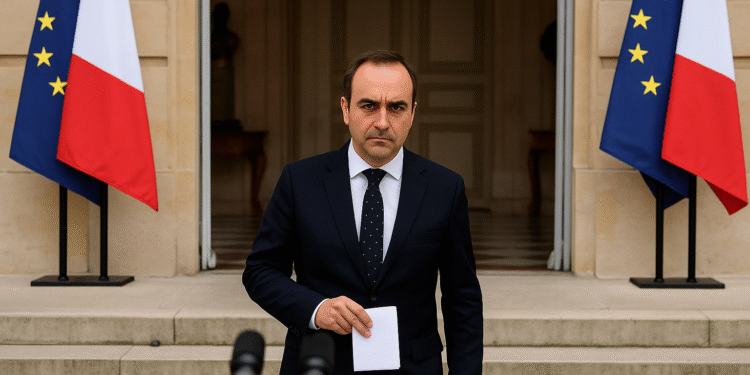France Faces Chaos as Prime Minister Sébastien Lecornu Resigns After One Day
Introduction
France’s political landscape was rocked on October 6, 2025, when Prime Minister Sébastien Lecornu tendered his resignation just hours after unveiling his cabinet. His brief tenure as leader became one of the shortest in modern French history which exposed the core issues that undermine French political stability. The sudden developments have raised doubts about what President Emmanuel Macron will do next and when the next French national elections will take place.
The Shock Resignation: What Happened
Lecornu was appointed by President Macron on September 9, 2025, following the collapse of the François Bayrou government.
On October 5 he officially presented his cabinet selection which received intense disapproval because it kept most of the previous administration’s officials.
Less than 24 hours later, on October 6, he submitted his government’s resignation to President Macron, citing that the conditions for effective governance were not met.
France’s PM Sébastien Lecornu Resigns as Political Crisis Deepens — AP NewsThe political parties’ refusal to compromise along with their focus on personal interests and their inability to work together became the main targets of Lecornu’s public criticism. “You should always prefer your country to your party,” he declared in his resignation remarks.
His abrupt exit, less than a day after naming his cabinet, plunges France further into political uncertainty.
Divided Parliament and Legislative Deadlock
The political situation today displays a divided Parliament because no party holds enough seats for majority control.
Since the 2024 snap legislative elections, France has operated with a fractured National Assembly, split among left-wing, far-right, and centrist blocs. No single faction maintains control of a stable majority.
Lecornu attempted to form alliances but met absolute opposition from all surrounding forces. Lack of consensus on key reforms (especially pensions and social security) made legislative progress nearly impossible.
Recycled Cabinet, Symbolic Continuity
The critics pointed out that Lecornu’s ministerial appointments were almost identical to the previous government which made his claims of change seem unconvincing. People in the public sector saw this change as a new branding strategy instead of a complete business transformation.
The governing coalition members who formed alliances showed their discontent with the selection process because it failed to represent their interests.
Refusal to Use Article 49.3 (But No Success)
Lecornu insisted he would avoid invoking Article 49.3—a constitutional shortcut that allows laws to pass without a parliamentary vote—to push his agenda. He planned to achieve his goals through discussions and mutual agreements.
His choice did not succeed in getting support from others. The opposition parties showed doubt about the plan which left Lecornu in a difficult position.
Political Ego and Unrealistic Expectations
The political parties failed to find common ground which led Lecornu to express his disappointment through public declarations. He explained that partisan interests and personal ambitions led to the collapse of cooperation.
The collapse revealed that individual goals and strategic placement gained precedence over political differences according to the rhetorical analysis.
Economic Fallout and Market Reactions
The crisis creates an instant economic collapse which leads to lower GDP and higher jobless rates. The crisis leads to substantial national debt accumulation and currency value decline. The crisis inflicts enduring economic harm to the nation which endangers both present financial stability and upcoming economic expansion.
Financial markets responded immediately to the news by causing the CAC 40 index of France to decline by 1.5–2% and the euro to lose value against other major currencies.
The current investor sentiment remains weak because France has rising debt levels and ongoing budget deficits. The political instability of the region creates additional challenges for the people.
The ministers will maintain their caretaker status until a new government takes office which restricts their ability to make policy decisions.
The current power vacuum creates rising vulnerabilities which become more dangerous with each passing day because of economic instability.
What Are Macron’s Options Now?
A. The selection of a new Prime Minister happened quickly.
Macron could name another centrist or technocratic figure quickly. The achievement of success requires backing from multiple political groups which make up different party blocs.
B. The government should dissolve Parliament and schedule immediate elections.
A new government could establish different power relations between the government and the people but organizing elections would be dangerous because it could strengthen right-wing political forces.
C. Extended Caretaker Government
A temporary government under Macron would handle critical matters until political parties begin their negotiation process. Major reforms could be delayed by this approach which would enable current crises to become more severe.
In all scenarios, Macron’s legitimacy and political capital will be tested more severely than ever.
Broader Implications for Europe
France is Europe’s second-largest economy and a pillar of the EU. Persistent internal instability weakens its ability to lead on common challenges — from defense to environmental policy.
The ongoing economic crisis in France could trigger nationalist and populist movements throughout Europe. Other governments may see this as justification for hardline politics.
The last point shows how investor confidence across the entire bloc could decline because markets dislike unpredictable situations and a weakening France makes them question the stability of the Eurozone.
Key Takeaways
- The Fifth Republic had its shortest period of leadership under Lecornu who served as president for only a few hours.
- The repeated collapse of French governments stems from two main factors: the fragmented structure of parliament and the absence of a majority government.
- The recycled cabinet collection failed to create an impression of change because it focused on visual appearance rather than delivering actual change.
- Macron holds the authority to decide between selecting new leadership immediately or conducting elections or creating interim governance structures.
- The political situation will remain unstable until a stable government takes control which will lead to ongoing policy stability and economic instability.

